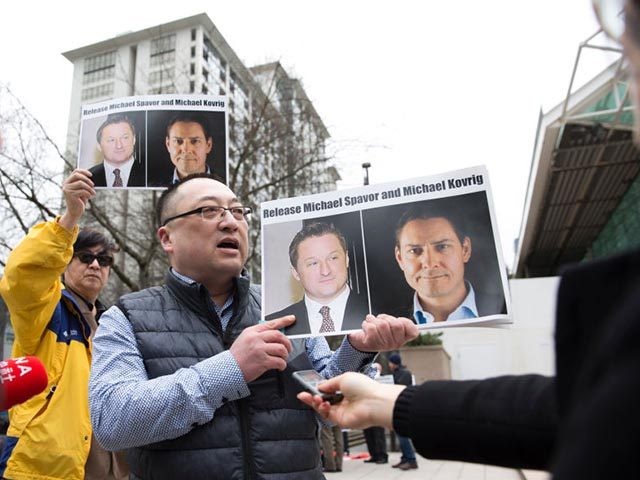A former British diplomat has started a campaign to send Christmas cards to two Canadians imprisoned in China.
Charles Parton, a former envoy to Beijing for the E.U., says he hopes to pressure the Chinese Communist Party (CCP) to release the two Canadian citizens, Michael Kovrig and Michael Spavor, and generally raise awareness about their situation.
Chinese authorities arrested Kovrig and Spavor in Beijing in March 2019. Many observers view their arrest, allegedly for spying, as retaliation for Chinese citizen Meng Wanzhou’s arrest by Canadian police in Vancouver in December 2018. Meng is the Chief Financial Officer of China’s state-owned telecom giant Huawei. She was detained by Canadian authorities at the request of U.S. government officials and has been under house arrest since then while her extradition case plays out in Canadian courts.
A former diplomat for Canada in Beijing, Kovrig most recently worked for the International Crisis Group. The BBC has described Spavor as “a business consultant dealing with North Korea.”
Parton, a former acquaintance of Kovrig from their overlapping time as diplomats in Beijing, told Voice of America (VOA) on December 12 that he was inspired to start his Christmas card campaign for the two Canadians after recently rereading the book Hostage in Peking by Anthony Grey, a British correspondent for Reuters imprisoned in China from 1967-1969.
Parton said he was struck by a passage in the memoir in which Grey “described how touched he was when he learned after his release that several thousand Britons and others had sent him Christmas cards while he was under arrest.”
“I suddenly thought a contemporary version to that would be to send the Christmas card, but make sure that before you send it to the Chinese Embassy, that you put it online, with whatever social media you wish, under the hashtag #FreeChinaHostages, so that lots of people can see it,” Parton added.
Parton acknowledged to VOA that the Christmas cards probably “won’t get any further” than the Chinese embassies. Despite this, he said, “it would make the point to the local Chinese embassy how upset a lot of people are at what happened.”
The campaign’s secondary aim is “to bring home to a wider public, the politicians, the press, just the nature of the way the Chinese Communist Party operates, therefore, whatever policy we devise towards them must take that into account,” Parton added.
“And thirdly, when Michael eventually does get out, or I should say, the two Michaels — I don’t know Michael Spavor, but of course his situation is the same – but when they get out, they realize a lot of people around the world cared,” he concluded.
Parton referred to the arrests of Kovrig and Spavor as “hostage diplomacy” in a statement launching the Christmas card campaign on December 9:
While the Chinese authorities have repeatedly denied engaging in hostage diplomacy, the timing of the arrests made evident that the events were connected, as did their other actions of imposing trade and political restrictions. Since then, the CCP has been more direct, saying that if Meng should be released, China-Canada relations would be back on track.
Kovrig’s employer at the time of his detention, the International Crisis Group, started its own initiative in solidarity with Parton’s Christmas card campaign. The group’s spokesperson, Karim Lebhour told VOA that he and his colleagues “have been preparing scrapbooks to present to Kovrig on the day he is released. One of the books will provide a record of events that have taken place while he was jailed.”

COMMENTS
Please let us know if you're having issues with commenting.